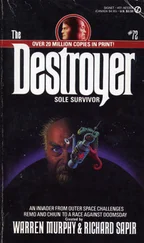‘Thank you, sweetheart,’ he said. ‘You’re right. I smell. I better get some soap.’
Behind him, someone said, ‘Everything all right?’
Joe turned and saw the Korean proprietor. The man’s previously placid face was now carved by worry.
‘I thought they were people I knew,’ Joe explained. ‘People I knew. once.’
He realized that he had left the apartment this morning without shaving. Stubbled, greasy with stale sweat, rumpled, breath sour and beery, eyes wild with blasted hope, he must be a daunting sight. Now he better understood the attitude of the people at the bank.
‘Everything all right?’ the proprietor asked the woman.
She was uncertain. ‘I guess so.’
‘I’m going,’ Joe said. He felt as if his internal organs were slip-sliding into new positions, his stomach rising and his heart dropping down into the pit of him. ‘It’s okay, okay, just a mistake, I’m going.’
He stepped past the owner and went quickly to the front of the store.
As he headed past the cashier’s counter toward the door, the Korean woman worriedly said, ‘Everything all right?’
‘Nothing, nothing,’ Joe said, and he hurried outside into the sedimentary heat of the settling day.
When he got into the Honda, he saw the manila envelope on the passenger’s seat. He had left twenty thousand dollars unattended in an unlocked car. Although there had been no miracle in the convenience store, it was a miracle that the money was still here.
Tortured by severe stomach cramps, with a tightness in his chest that restricted his breathing, Joe wasn’t confident of his ability to drive with adequate attention to traffic. But he didn’t want the woman to think that he was waiting for her, stalking her. He started the Honda and left the shopping centre.
Switching on the air conditioning, tilting the vents toward his face, he struggled for breath, as if his lungs had collapsed and he was striving to re-inflate them with sheer willpower. What air he was able to inhale was heavy inside him, like a scalding liquid.
This was something else that he had learned from Compassionate Friends meetings: For most of those who lost children, not just for him, the pain was at times physical, stunning.
Wounded, he drove half hunched over the steering wheel, wheezing like an asthmatic.
He thought of the angry vow that he had made to destroy those who might be to blame for the fate of Flight 353, and he laughed briefly, sourly, at his foolishness, at the unlikely image of himself as an unstoppable engine of vengeance. He was walking wreckage. Dangerous to no one.
If he learned what had really happened to that 747, if treachery was indeed involved, and if he discovered who was responsible, the perpetrators would kill him before he could lift a hand against them. They were powerful, with apparently vast resources. He had no chance of bringing them to justice.
Nevertheless, he’d keep trying. The choice to turn away from the hunt was not his to make. Compulsion drove him. Searching behaviour.
At a K-Mart, Joe purchased an electric razor and a bottle of aftershave. He bought a toothbrush, toothpaste, and toiletries.
The glare of the fluorescent lights cut at his eyes. One wheel on his shopping cart wobbled noisily, louder in his imagination than in reality, exacerbating his headache.
Shopping quickly, he bought a suitcase, two pair of blue jeans, a grey sports coat — corduroy, because the fall lines were already on display in August — underwear, T-shirts, athletic socks, and a new pair of Nikes. He went strictly by the stated size, trying nothing.
After leaving K-Mart, he found a modest, clean motel in Malibu, on the ocean, where later he might be able to sleep to the rumble of the surf. He shaved, showered, and changed into clean clothes.
By seven-thirty, with an hour of sunlight left, he drove east to Culver City, where Thomas Lee Vadance’s widow lived. Thomas had been listed on the passenger manifest for Flight 353, and his wife, Nora, had been quoted by the Post.
At a McDonald’s, Joe bought two cheeseburgers and a cola. In the steel-tethered book at the restaurant’s public phone, he found a number and an address for Nora Vadance.
From his previous life as a reporter, he had a Thomas Brothers Guide, the indispensable book of Los Angeles County street maps, but he thought he knew Mrs. Vadance’s neighbourhood.
While he drove, he ate both of the burgers and washed them down with the cola. He was surprised by his own sudden hunger.
The single-story house had a cedar-shingle roof, shingled walls, white trim, and white shutters. It was an odd mix of California ranch house and New England coastal cottage, but with its flagstone walkway and neatly tended beds of impatiens and agapantha, it was charming.
The day was still warm. Heat shimmered off the flagstones.
With an orange-pink glow growing in the western sky and purple twilight just sliding into view in the east, Joe climbed two steps onto the porch and rang the bell.
The woman who answered the door was about thirty years old and pretty in a fresh-faced way. Although she was a brunette, she had the fair complexion of a redhead, with freckles and green eyes. She was in khaki shorts and a man’s threadbare white shirt with the sleeves rolled up. Her hair was in disarray and damp with sweat, and on her left cheek was a smudge of dirt.
She looked as if she had been doing housework. And crying.
‘Mrs. Vadance?’ Joe asked.
‘Yes.’
Although he had always been smooth about ingratiating himself with an interviewee when he had been a reporter, he was awkward now. He felt too casually dressed for the serious questions that he had come to ask. His jeans were loose, the waistband gathered and cinched with a belt, and because the air was hot, he’d left the Sports coat in the Honda. He wished he’d bought a shirt instead of just T-shirts.
‘Mrs. Vadance, I was wondering if I could speak with you—’
‘I’m very busy right now—’
‘My name’s Joe Carpenter. My wife died on the plane. And my two little girls.’
Her breath caught in her throat. Then: ‘One year ago.’
‘Yes. Tonight.’
She stepped back from the door. ‘Come in.’
He followed her into a cheery, predominantly white and yellow living room with chintz drapes and pillows. A dozen Liadro porcelains stood in a lighted corner display case.
She asked Joe to have a seat. As he settled in an armchair, she went to a doorway and called, ‘Bob? Bob, we have a visitor.’
‘I’m sorry to bother you on a Saturday night,’ Joe said. Returning from the doorway and perching on the sofa, the woman said, ‘Not at all. But I’m afraid I’m not the Mrs. Vadance you came to see. I’m not Nora. My name’s Clarise. It was my mother-in-law who lost her husband in the… in the accident.’
From the back of the house, a man entered the living room, and Clarise introduced him as her husband. He was perhaps two years older than his wife, tall, lanky, crew-cut, with a pleasant and self-confident manner. His handshake was firm and his smile easy, but under his tan was a paleness, in his blue eyes a sorrow.
As Bob Vadance sat on the sofa beside his wife, Clarise explained that Joe’s family had perished in the crash. To Joe, she said, ‘It was Bob’s dad we lost, coming back from a business trip.’
Of all the things that they might have said to one another, they established their bond by talking about how they had first heard the dreadful news out of Colorado.
Clarise and Bob, a fighter pilot assigned to Miramar Naval Air Station north of San Diego, had been out to dinner with two other pilots and their wives. They were at a cosy Italian restaurant and, after dinner, moved into the bar, where there was a television set. The baseball game was interrupted for a bulletin about Nationwide Flight 353. Bob had known his dad was flying that night from New York to L.A. and that he often travelled Nationwide, but he hadn’t known the flight number. Using a bar phone to call Nationwide at LAX, he was quickly connected with a public-relations officer who confirmed that Thomas Lee Vadance was on the passenger manifest. Bob and Clarise had driven from Miramar to Culver City in record time, arriving shortly after eleven o’clock. They didn’t call Nora, Bob’s mother, because they didn’t know if she had heard. If she was still unaware of the news, they wanted to tell her in person rather than over the phone. When they arrived just after midnight, the house was brightly lighted, the front door unlocked. Nora was in the kitchen, making corn chowder, a big pot of corn chowder, because Tom loved her corn chowder, and she was baking chocolate-chip cookies with pecans because Bob loved those cookies too. She knew about the crash, knew that he was dead out there just east of the Rockies, but she needed to be doing something for him. They had been married when Nora was eighteen and Tom was twenty, had been married for thirty-five years, and she had needed to be doing something for him.
Читать дальше












